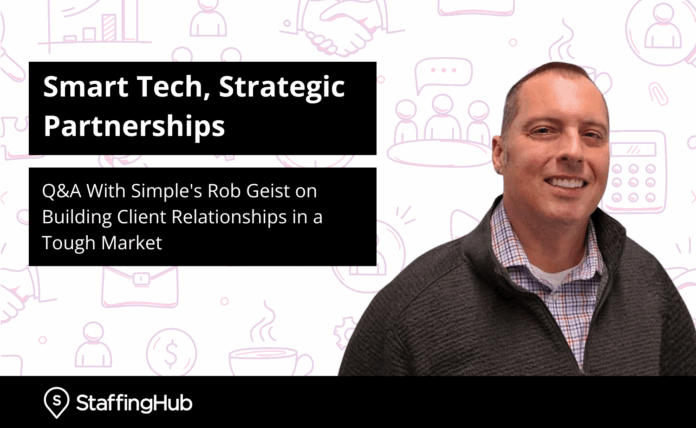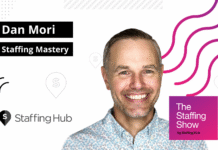
As staffing firms grapple with operating in a tough market, Rob Geist, SVP of Growth at Simple, believes strategic partnerships with technology vendors offer a competitive advantage.
In our conversation with Geist at this year’s Avionté CONNECT conference, we touch on how staffing firms are navigating one of the industry’s most challenging times in recent years.
Geist, drawing from decades of experience spanning both the staffing and technology sides of the business, shares how agencies can leverage their tech stack not just for efficiency, but as a differentiator in building and strengthening client relationships. He discusses how manual processes can jeopardize those relationships and advises agencies on tapping into all technology has to offer — from timekeeping to full platform integration.
Q. What kinds of conversations are you having with staffing leaders here at CONNECT — especially around tech and client relationships?
Rob Geist: What people are talking about is how are leaders navigating this tough market? How are they using tech to enable growth and to move their businesses forward?
We came from COVID, where you had so many orders you didn’t know what to do with them and people frankly stopped selling. Now you’re in a recession of orders instead of a recession of candidates, and everybody’s looking at how to make themselves stand out in the marketplace.
Q. You’ve said tech should open doors, not replace people — especially in sales. What are the best firms doing to use their tech stack to build client relationships?
RG: Sales and recruiting go hand-in-hand in my mind. You hear everyone talking about AI, and where it’s going to leave us as a salesperson or as a recruiter. But what I hear when I speak to the leaders and influencers in the space is, AI’s meeting people in the middle where they want to be met.
What I foresee and hope is that it’s going to help the high performers perform even better. On the sales side, it’s going to enable them to make more money and be more efficient. On the recruiting side, it’s going to automate candidate follow-up, do the menial tasks that take so much time, and allow you to focus on the human touch that is so important in our industry.
You’re not going to sell AI to two different clients that have two different objectives. Same on the recruiting side. You might have a millennial applicant that doesn’t care to talk to someone, and is fine to complete everything without human interaction, but then you’ve got somebody my age that says, “I want to talk to a real person.”
Q. Where do you see trust start to break down when firms rely too heavily on manual processes?
RG: With manual processes, you’re relying on people to do the work. So if one of your best recruiters who does that work moves on, it can be hard to fill those shoes. And in staffing, as much as I hate to say it, you’re only as good as your last fill a lot of times.
Having those manual processes leaves room for gaps, but it also doesn’t allow you to differentiate yourself and sell that to your potential prospects out there. Dan Mori talks about how you need to find your ideal client profile, then find your unique value proposition to sell to them. Tech can absolutely help you with that unique value proposition, especially in the staffing industry.
The way I always put it is, I want to have a Swiss Army knife of tools in my pocket. Whatever my client needs — whether that’s a VMS, automation, dashboards and reporting, or something as simple as timekeeping. You’d be shocked at how many established staffing firms don’t have a reliable time clock to deploy for their clients. And that’s the most basic and simple thing. At the end of the day, when you’re talking about people writing down their hours, there’s real dollars that can be saved by having an actual clock to accurately record that.
Q. On the flip side — when agencies use tech well, how does that build credibility and trust with clients?
RG: This isn’t a Simple sales pitch, but since we’ve built the integration with Avionté, all these Avionté suppliers can now look at Simple clients and say, “Hey, we’ve got this competitive advantage because of this integration that’s been built between Simple and our back-office ATS. We can get better time-to-fill. We can have people ready for you and deploy them much quicker than our competition.”
Q. What’s one thing high-performing firms do differently to show up as strategic partners — not just vendors?
RG: I always say staffing’s the most relationship-driven industry that I’ve ever worked in, and every supplier out there wants to be a strategic partner — you don’t just want to be another vendor.
Over the last two years, our CEO, Rishabh Mehrotra, was talking about platform staffing. When all your systems talk with your client’s systems, you can get people to them faster. You can do what you do best, which is recruit and retain talent, instead of doing all the manual work behind that, which is very laborious. I think people would be surprised at how much can be automated and how much it would allow them to focus on the important things — like getting your client the people they need and improving your time-to-fill rates.
I see the high performers moving towards having systems that talk to each other so they can have one platform to deliver for their clients.
Q. For firms that want to evolve but feel stuck — what’s one first step to better align their tech with their client strategy?
RG: First of all, you need to take baby steps. I’ve seen too many people dive headfirst into a technology and then that technology fails, and they’ve wasted a ton of money and time on deployment. You really need to talk to different providers and decide which one is best for you, whether that’s Simple or another VMS, whether that’s this AI tool or another one.
You have to find the software and tech provider that wants to meet you where you want to start and become a true partner. There are too many software providers and tech companies out there that just want to give you the software and never talk to you again.
I love tech, but the thing that makes most tech good is the people behind it. So you want to find providers that have good teams in place to support you, to give you what you need. Sometimes what you need is going to be different than the person who walked in before you.
A provider who’s willing to customize — not make you change your processes — and build it around your agency is hugely important, especially in a world where people can be resistant to change.
Q. What’s one thing agency leaders often overlook when it comes to trust and tech working together?
RG: They really need to think outside of the box.
For the last 15 years, our slogan at Staffing World was “VMS doesn’t have to be a dirty word,” because all the other VMS providers treated staffing agencies like they weren’t equally important parts of the process.
You have to shift the way you’re thinking. If you’re a grizzled old staffing veteran CEO that hasn’t changed in 15 years, you might have to look across the aisle and consider that what used to be your competitor could be your competitive advantage today.
Q. What are the most forward-thinking agencies doing right now to future-proof their relationships — and stay ahead of shifting client expectations?
RG: It’s about picking a vertical that you can support properly. Identify who your ideal clients are and what you do best, and then surround yourself with the proper tools to enable your team to do things most efficiently. You can do more with less today because of all the tech that’s available.
Connect with Rob Geist and Simple to learn more about their agency-focused approach to vendor management systems.
Interested in attending CONNECT 2026? Follow Avionté for updates.







